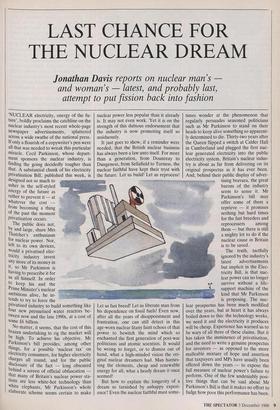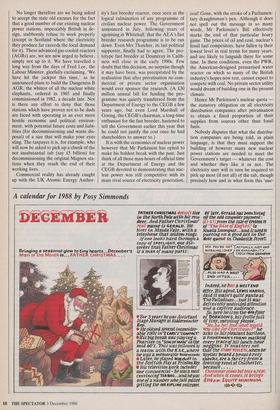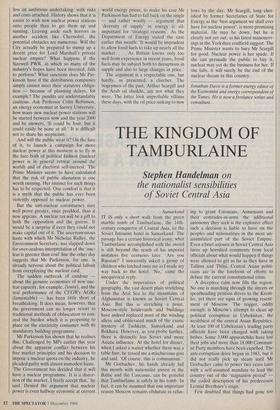LAST CHANCE FOR THE NUCLEAR DREAM
Jonathan Davis reports on nuclear man's
and woman's — latest, and probably last, attempt to put fission back into fashion
'NUCLEAR electricity, energy of the fu- ture', boldly proclaims the catchline on the nuclear industry's most recent whole-page newspaper advertisements, splattered across a wide swathe of the national press. If only a flourish of a copywriter's pen were all that was needed to wreak this particular miracle. Cecil Parkinson, whose depart- ment sponsors the nuclear industry, is finding the going decidedly tougher than that. A substantial chunk of his electricity Privatisation Bill, published this week, is designed not so much to usher in the self-styled energy of the future as rather to prevent it — at Whatever the cost — from becoming a thing of the past the moment Privatisation occurs.
No matter, it seems, that the cost of this brazen undertaking to rig the market will be high. To achieve his objective, Mr Parkinson's bill provides, among other things, for a possible 'nuclear tax' on electricity consumers, for higher electricity Charges all round, and for the public disclosure of the fact — long obscured behind a screen of official obfuscation — that many of Britain's nuclear power sta- tions are less white-hot technology than White elephants, Mr Parkinson's whole elaborate scheme seems certain to make
nuclear power less popular than it already is. It may not even work. Yet it is on the strength of this dubious endorsement that the industry is now promoting itself so assiduously.
It just goes to show, if a reminder were needed, that the British nuclear business has always been a law unto itself. For more than a generation, from Dounreay to Dungeness, from Sellafield to Torness, the nuclear faithful have kept their tryst with the future. Let us build! Let us reprocess!
Let us fast breed! Let us liberate man from his dependence on fossil fuels! Even now, after all the years of disappointment and frustration, one can still detect in this age-worn nuclear litany faint echoes of that power to bewitch the mind which so enchanted the first generation of post-war politicians and atomic scientists. It would be wrong to forget, or to dismiss out of hand, what a high-minded vision the ori- ginal nuclear dreamers had. Man harnes- sing the elements, cheap and renewable energy for all; what a heady dream it once seemed!
But how to explain the longevity of a dream so tarnished by unhappy experi- ence? Even the nuclear faithful must some-
times wonder at the phenomenon that regularly persuades seasoned politicians such as Mr Parkinson to stand on their heads to keep alive something so apparent- ly determined to die. Thirty-two years after the Queen flipped a switch at Calder Hall in Cumberland and plugged the first nuc- lear generated electricity into the public electricity system, Britain's nuclear indus- try is about as far from delivering on its original prospectus as it has ever been. And, behind their public display of adver- tising bravura, the great barons of the industry seem to sense it. Mr Parkinson's bill may offer some of them a reprieve — it promises nothing but hard times for the fast breeders and reprocessers among them — but there is still a mighty lot to do if the nuclear cause in Britain is to be saved.
The truth, tactfully ignored by the industry's latest advertisements but implicit in the Elec- tricity Bill, is that nuc- lear power can no longer survive without a life- support machine of the kind that Mr Parkinson is proposing. The nuc- lear prospectus has been much modified over the years, but at heart it has always boiled down to this: the technology works, we need it and the electricity it produces will be cheap. Experience has warned us to be wary of all three of these claims. But it has taken the imminence of privatisation, and the need to write a genuine prospectus for investors — as opposed to the more malleable mixture of hope and assertion that taxpayers and MPs have usually been offered down the years — to expose the full measure of nuclear power's failure to perform. One of the few undeniably posi- tive things that can be said about Mr Parkinson's Bill is that it makes no effort to fudge how poor this performance has been. No longer therefore are we being asked to accept the stale old excuses for the fact that a good number of our existing nuclear power stations, impeccably British in de- sign, stubbornly refuse to work properly (except in Scotland where the electricity they produce far exceeds the local demand for it). These advanced gas-cooled reactors (AGRs) are, we are now urged to believe, simply not up to it. We have travelled a long way from the days of Fred Lee, the Labour Minister, gleefully exclaiming, We have hit the jackpot this time,' as he announced plans to build the Dungeness B AGR, the whitest of all the nuclear white elephants, ordered in 1965 and finally commissioned in 1982, a decade late. Nor is there any effort to deny that those stations which have proven not to be duds are faced with operating in an ever more hostile economic and political environ- ment, with potential future costs and liabi- lities (for decommissioning and waste dis- posal) of a size that will make your eyes sting. The taxpayer it is, for example, who will now be asked to pick up a chunk of the not insubstantial tab (say £5 billion) for decommissioning the original Magnox sta- tions when they reach the end of their working lives.
Commercial reality has already caught up with the UK Atomic Energy Author- ity's fast breeder reactor, once seen as the logical culmination of any programme of civilian nuclear power. The Government announced in July, following years of agonising in Whitehall, that the AEA's fast breeder research programme is to be run down. Even Mrs Thatcher, its last political supporter, finally had to agree. The pro- totype fast breeder at Dounreay in Caith- ness will close in the early 1990s. Few doubt that this decision, no surprise though it may have been, was precipitated by the realisation that after privatisation no com- mercial or private sector organisation would ever sponsor the research. (A £30 million annual bill for funding the pro- gramme was quietly transferred from the Department of Energy to the CEGB a few years ago, but even Lord Marshall of Goring, the CEGB's chairman, a long-time enthusiast for the fast breeder, hastened to tell the Government earlier this year that he could not justify the cost once he had shareholders to answer to.) It is with the economics of nuclear power however that Mr Parkinson has opted to make his boldest break with the past. Just think of all those man-hours of official time at the Department of Energy and the CEGB devoted to demonstrating that nuc- lear power was still competitive with its main rival source of electricity generation, coal! Gone, with the stroke of a Parliamen- tary draughtsman's pen. Although it does not spell out the message in so many words, Mr Parkinson's Bill effectively marks the end of that particular hoary game. The prices of oil and coal, nuclear's fossil fuel competitors, have fallen to their lowest level in real terms for many years, and are likely to languish there for some time. in these conditions, even the PWR, the American-designed pressurised water reactor on which so many of the British industry's hopes now rest, cannot expect to compete with coal. No private sector utility would dream of building one in the present climate.
Hence Mr Parkinson's nuclear quota -- the statutory obligation on all electricity distribution companies after privatisation to obtain a fixed proportion of their supplies from sources other than fossil fuels.
Nobody disputes that what the distribu- tion companies are being told, in plain language, is that they must support the building of however many new nuclear power stations are needed to meet the Government's target — whatever the cost and whether they like it or not. The electricity user will in turn be required to pick up most (if not all) of the tab, though precisely how and in what form this 'nuc- lear tax' — for that is what it amounts to — will be levied remains to be seen. The important point is that, for the first time in the post-war period, the electricity con- sumer is being explicitly asked to subsidise the cost of building new nuclear power stations for which there is, strictly speak- ing, no economic rationale.
This may be honest, but does it make sense? On the face of it, inviting the public to pay a subsidy for additional nuclear power stations that nobody wants to build is an act of plain political folly. Even allowing for the Government's manifesto Commitment to put more resources into nuclear power, one might have expected something rather less direct and uncom- promising than simple nuclear dirigisme from such an accomplished political sales- man as Mr Parkinson. True, in drawing up his privatisation plans, he has had to steer a delicate path between the conflicting objectives of introducing competition into the electricity industry, achieving the sale of all its component parts, and maintaining the Government's commitment to nuclear Power. But there is something so brazen about his plans to force nuclear power down the country's throat that it seems, to some in Whitehall at least, to defy simple or rational explanation. (Not least because there is little in the proposed regulatory regime, such of it as we have seen so far, that promises to give the nuclear industry itself any real incentive to improve its lamentable record for designing and build- ing nuclear power stations that work.) There seems to be little doubt that the real impetus behind the nuclear commit- ment lies not just in Mr Parkinson's office, but in Downing Street. Mrs Thatcher was once something of a dabbler in nuclear science herself, and has never, it seems, quite lost her faith in the cause. The memories of Ted Heath's defeat at the hands of the miners, and her own enforced climbdown over pit closures in 1981, are still at the forefront of her mind. The defeat of the miners' strike has not re- moved the desire for armoury to protect herself against the spectre of resurgent Scargillism. Even the startling emergence of Maggie the Green a few months ago, it now appears, has to be seen in the light of her determination to give nuclear power one last chance to prove itself. What started out as a simple debating point — that electricity generated from fossil fuels causes more atmospheric harm than nuc- lear power — has been elevated, none too subtly, into a central plank of the political Case for more nuclear power stations. Two obvious questions therefore arise. Will Mr Parkinson's scheme work? And Will he and the Prime Minister be able to sell it to the world at large? By earlier standards, this new commitment to nuclear Power is relatively modest. Only a few years ago the Department of Energy was talking about building one new PWR a year for the next ten years. It is nonethe- less an ambitious undertaking, with risks and costs attached. History shows that it is easier to wish new nuclear power stations onto people than to get them up and running. Leaving aside such horrors as another accident like Chernobyl, the potential obstacles are numerous. Will the City actually be prepared to stump up a decent price for Lord Marshall's private nuclear empire? What happens if the Sizewell PWR, in which so many of the industry's hopes have been invested, fails to perform? What sanctions does Mr Par- kinson have if the distribution companies simply cannot meet their statutory obliga- tion — because of planning delays, for example? The pundits are understandably cautious. Ask Professor Colin Robinson, an energy economist at Surrey University, how many new nuclear power stations will be started between now and the year 2000 and he answers, 'It could be four, but it could easily be none at all) It is difficult not to share his scepticism.
And will the public wear it? On the face of it, to launch a campaign for more nuclear power at this moment is to fly in the face both of political fashion (nuclear power is in general retreat around the world) and of electoral self-interest. The Prime Minister seems to have calculated that the risk of public alienation is one worth running. Her instinct for such things has to be respected. One comfort is that it is a myth that the public has ever been violently opposed to nuclear power.
But the anti-nuclear constituency may well prove greater, once prodded, than it now appears. A nuclear tax will be a gift to both the opposition and the greens. It would he a surprise if even they could not make capital out of it. The unceremonious haste with which Mr Nicholas Ridley, the Environment Secretary, was slapped down for over-zealous interpretation of the 'nuc- lear is greener than coal' line the other day suggests that Mr Parkinson, for one, is already nervous about the political fallout from overplaying the nuclear card.
The sudden outbreak of candour — about the genuine economics of new nuc- lear capacity, for example, (lousy), and the real performance of the CEGB's AGRs (lamentable) -- has been little short of breathtaking. It does mean, however, that the government can no longer resort to traditional methods of obfuscation to con- ceal the burden which it is proposing to place on the electricity consumer with its mandatory building programme. Mr Parkinson has shown that he realises this Challenged by MPs earlier this year about the apparent conflict between his free market principles and his decision to impose a nuclear quota on the industry, he pleaded guilty with almost immodest haste. The Government has decided that it will have a nuclear programme. It is a distor- tion of the market, I freely accept that,' he said. Denied the argument that nuclear power is even halfway economic at current world energy prices, to make his case Mr Parkinson has had to fall back on the single — and rather woolly — argument that 'diversity of supply' in energy is all- important for 'strategic reasons'. As the Department of Energy stated the case earlier this month: 'It would be imprudent to allow fossil fuels to take up nearly all the market. . . . As Britain knows only too well from experience in recent years, fossil fuels may be subject both to disruptions in supply and also to large changes in price.'
The argument is a respectable one, but hardly, as presented, a clincher. The bogeymen of the past, Arthur Scargill and the Arab oil sheikhs, are not what they were. The latter look improbable villains these days, with the oil price sinking to new lows by the day. Mr Scargill, long cher- ished by former Secretaries of State for Energy as the 'best argument we shall ever have for nuclear power', is more promising material. He may be down, but he is clearly not yet out, as his latest manouevr- ings in the Yorkshire coalfield suggest. The Prime Minister wants to bury Mr Scargill for good. Nuclear power is her spade. If she can persuade the public to buy it, nuclear may yet do the business for her. If she fails, it will surely be the end of the nuclear dream in this country.
Jonathan Davis is a former energy editor of the Economist and energy correspondent of the Times. He is now a freelance writer and consultant.





































































 Previous page
Previous page